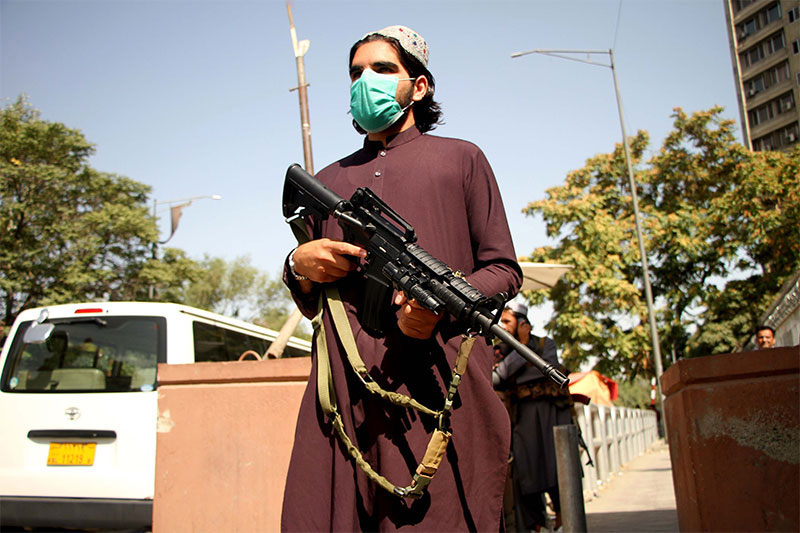Regression, Repression, Incoherence

On April 1, 2023, Taliban Director for Information and Culture in Badakhshan Province, Moezuddin Ahmadi, confirmed that the country’s only women-run radio station, Sadai Banowan (Women’s Voice), had been shut down as the station violated the "laws and regulations of the Islamic Emirate [of Afghanistan]" several times, by broadcasting songs and music during the Islamic month of Ramadan.
He, however, added that, “if this radio station accepts the policy of the Islamic Emirate of Afghanistan and gives a guarantee that it will not repeat such a thing again” then “we will allow it to operate again.”
Rejecting the Taliban’s allegation, Radio Station head Najia Sorosh, asserted that the Taliban "told us that you have broadcast music” but “we have not broadcast any kind of music".
She disclosed that, at 11:40 am [AST] on March 30, representatives from the Ministry of Information and Culture and the Vice and Virtue Directorate arrived at the station and shut it down. She called the order for closure a conspiracy. The radio station started 10 years ago and has a staff of eight people, six of them female.
On January 28, 2023, Ziaullah Hashmi, a spokesperson for the Taliban higher education ministry, confirmed that they had sent out a letter to private Afghan universities across the country, ordering them not to enroll female students for the upcoming spring semester. The letter warned that universities that failed to enforce the edict would face legal action. The entrance examinations were scheduled to take place at the end of February.
There were several such anti-women actions taken by the Taliban through 2022. In fact, since coming to power in August 2021, Taliban has taken series of repressive measures against women.
Indeed, in a briefing to the United Nations Security Council on March 8, 2023, Roza Otunbayeva, United Nations Secretary-General's Special Representative for Afghanistan, observed,
The bans against women working, studying, traveling without a male companion, and even going to parks or baths remain in place. The Taliban claim to have united the country but they have also severely divided it by gender. At a moment when Afghanistan needs all of its human capital to recover from decades of war, half of the country's potential doctors, scientists, journalists, and politicians are shut in their homes, their dreams crushed and their talents confiscated. Afghanistan under the Taliban remains the most repressive country in the world regarding women's rights.
Significantly, among several issues that have impeded the Taliban regime's attempts to secure international recognition, the dire state of women in the society has been the most significant. The other major impediment is the Taliban's wider human rights record.
Since coming to power, the Taliban has been targeting those who were close to the previous government, as well as the general masses who are opposed to the Taliban’s socio-religious diktats. Between August 15, when Taliban took over power in Kabul, and December 31, 2021, the Taliban was responsible for at least 44 civilian killings. In 2022, another 129 of the total of 382 civilian killings in which the perpetrator was identified, were executed by the Taliban. Islamic State-Khorasan Province (IS-KP or Da’esh) was responsible for the remaining 253 such killings. There was a total of 878 civilian killings in 2022, of which 496 remained unattributable. In 2023, the Taliban has already killed at least 19 civilians (data till April 2).
While executing these targeted killings, the Taliban has, on several occasions, demonstrated extreme brutality. Most recently, on March 24, 2023, the Taliban beheaded a Quranic scholar, Abdul Wadood, in front of his family members' eyes in the village of Qarqin on the Jowzjan-Sar-i-Pul highway in Jawzjan Province. Other prominent cases of brutality included:
February 8, 2023: The Taliban tortured a former ‘Regiment Commander’ of the Afghan Army, Sayed Merajuddin, in Jawzjan Province. Merajuddin eventually died of torture at an undisclosed location.
January 10, 2023: Taliban fighters beheaded and then shot a civilian, identified as Ali Ahmad, in the Darabad area of Farah Province. .
December 23, 2022: Taliban fighters raped two young girls and then beheaded them in front of their families in Surkh Qala village in Ruy-e-Du Ab District, Samangan Province.
November 24, 2022: Nine civilians, including four children (all Hazaras), were killed and beheaded in
the Hazara village of Siwak Shibar in the Nili District of Daikundi Province. A clash erupted after Taliban fighters attempted to arrest ‘rebels’ from the village and the villagers resisted. One Taliban fighter was also killed in the incident.
November 6, 2022: Taliban’s senior vice and virtue agent Mullah Yasin killed a teenage girl for refusing a forced marriage proposal, in the Sholgara District of Balkh Province.
July 20, 2022: Taliban fighters beheaded a 17-year-old boy in the Kasa Tarash village of Dih Salah District, Baghlan Province.
June 2, 2022: Taliban fighters killed 12 civilians while they were returning home from a party, at a checkpoint in Nahrin District, Baghlan Province. The Taliban fighters allegedly killed them for attending night parties.
The Taliban has also been carrying out brutal ‘legal’ punishments since coming to power. For instance, on January 4, 2023, the Taliban killed a former member of the Afghanistan National Defence and Security Forces identified as Mohammad Hashem, after torturing him, and hanged his body in public. He was detained by the Taliban from his house in the Baghlan District of Baghlan Province. Earlier, on December 7, 2022, Taliban executed a murder convict, identified as Tajmir, in a sports stadium in Farah Province. The execution was witnessed by top officials, including Taliban Deputy Prime Minister Mullah Abdul Ghani Baradar, Interior Minister Sirajuddin Haqqani and Foreign Minister Amir Khan Muttaqi. This was the first public execution since the Taliban returned to power.
On December 8, 27 people, including 10 women were administered lashings in a Sports stadium in Charikar, Parwan Province. Their crimes covered homosexuality, fraud, elopement and robbery. Local Appellant Court Head Shaikh Mohammad Qaseem claimed that public punishment would bring down crime and corruption. Public lashing of women and men on several such charges of crime have become a regular routine.
More recently, on February 17, 2023, the supreme court of the Taliban said that 11 people, including two women, were publicly flogged at a sports ground in the city of Faizabad in Badakhshan Province as they were engaged in “moral crimes and adultery”.
Indeed, on September 22, 2021 Senior Taliban leader Mullah Nooruddin Turabi had stressed the "necessity" of imposing punishments such as amputations and summary executions according to the Sharia, and cautioned other countries against "interference".
These issues – atrocities against women and against the general masses – have, meanwhile, deepened the long-standing internal rift within the Taliban leadership. For instance, on February 3, 2023, Taliban Supreme Leader Haibatullah Akhundzada vowed to continue with his regressive policies on women. However, in increasing signs of dissent, addressing a ceremony in the Khost Province on February 11, 2023, Interior Minister Sirajuddin Haqqani described the situation in country as “intolerable” and stressed that the Islamic Emirate of Afghanistan wants “legitimate engagement” with the international community. On February 13, Deputy Prime Minister, Abdul Salam Hanafi, the senior-most non-Pashto Taliban leader to hold a Cabinet appointment, criticized the continuation of the ban on girls’ education in Afghanistan More recently, on March 31, 2023, the Taliban Deputy Foreign Minister for Political Affairs, Sher Mohammad Abbas Stanikzai, called for the reopening of schools and universities for girls and women. He further said that he has always supported women and girls' education in Afghanistan and stressed reopening the doors of schools and universities. .
Meanwhile, the humanitarian crisis continued to deepen. Roza Otunbayeva, in her briefing on March 8, 2023, had highlighted,
Afghanistan remains the largest humanitarian crisis globally. Two-thirds of the population, 28 million people, will need humanitarian assistance this year to survive. This will cost $4.62 billion, the single-largest country appeal ever. Almost half of the population, 20 million people, are experiencing crisis levels of food insecurity. Six million are one step away from famine-like conditions.
All these crisis - the non-recognition of the regime by international community, deepening internal rifts, a burgeoning humanitarian crisis, etc., - have dealt a body blow to the Taliban's effort to gain complete control over the entire country even after the completion of over 19 months in power in Kabul. The two principal challengers to the Taliban regime - the Resistance Forces and Da'esh- continue to build their respective operational capabilities.
Inputs indicate that, during 2022, the Resistance Forces killed 1,239 Taliban fighters, losing 208 of their own. In 2023, the Resistance Forces have already killed 70 Taliban fighters and have lost two of their own (data till April 2). Among several active Resistance Forces, the Ahmad Massoud-led National Resistance Front (NRF) has emerged as the most potent anti-Taliban formation. On December 31, 2022, NRF Spokesperson and Director of Strategic Communications Sibghatullah Ahmadi tweeted,
Provided that the coercion, invasion, crimes of the Taliban and the killing of the downtrodden people of Afghanistan continue, the military resistance of our people will also continue. In the coming year, the resistance against the Taliban will expand and we will witness greater attainments and impressive progress of the National Resistance Front.
The NRF reportedly has a strength of 40,000 personnel and includes an 8,000-strong high-readiness contingent, with air, sea and special operations soldiers that can be deployed within days.
Meanwhile, the Afghan Freedom Front (AFF), another prominent Resistance Force, in its report on its year-old operations released on February 28, 2023, claimed 361 Taliban were killed and 364 wounded in 109 operations. It also claimed an active presence in 18 Afghan provinces. The Front's operational strategy for the coming year is to conduct precise targeting of Taliban gathering points and bases throughout Afghanistan, in addition to fomenting civil struggle across the country. In 2023, AFF has killed 13 Taliban fighters (data till April 2).
Da’esh remains the most active terrorist group in the country, accounting for 253 civilian killings in 2022. At least 43 civilians have already been killed by Da’esh terrorists in 2023 (till Aprl 2). Further, Da’esh killed 140 Taliban fighters and lost 112 of its own cadres in 2022. In 2023, it has lost 21 cadres, though it has failed to inflict any casualty on the Taliban. In 2020, the outfit claimed 82 attacks, which increased to 365 in 2021. In 2022, Da’esh claimed 163 attacks and has claimed two attacks in 2023, so far.
On February 13, 2023, the United Nations Security Council Committee released its 31st Report of the Analytical Support and Sanctions Monitoring Team concerning Da'esh, Al-Qaeda and associated individuals and entities, which estimated current Da'esh strength in Afghanistan at around 6,000. More worryingly, the report noted,
Afghanistan remains the primary source of terrorist threat for Central and South Asia. It originates from groups including the Islamic State of Iraq and the Levant-Khorasan (ISIL-K) [Da'esh], Al-Qaida, Tehrik-e Taliban Pakistan (TTP), as well as ETIM/TIP [East Turkestan Islamic Movement/ Turkistan Islamic Party], Islamic Movement of Uzbekistan (IMU), Islamic Jihad Group, Khatiba Imam al-Bukhari (KIB), Khatiba al-Tawhid wal-Jihad (KTJ), Jamaat Ansarullah and others.
Compounding the country's multiple crises, Afghanistan - Pakistan relations are currently at striking low as a result of grating friction over the Durand line as well as the presence of the Tehreek-e-Taliban Pakistan (TTP) inside Afghanistan. Islamabad alleges that the TTP has been provided sanctuary inside Afghan territory, from where it is carrying out a rising tide of cross-border attacks into Pakistan. The Afghan Taliban denies all such allegations. According to partial data compiled by the South Asia Terrorism Portal (SATP), since September 15, 2013, when the first such attack was reported, there have been at least 141 attacks across the Afghan border, in which at least 263 Pakistani Security Force (SF) personnel and 76 civilians have been killed, while another 339 sustained injuries. 88 terrorists were also killed in retaliatory action by Pakistani SFs. In the most recent incident, on December 15, 2022, at least one person was killed while 15 were injured in firing from the Afghan side, across the border, in the Chaman District of Balochistan. Earlier, on November 13, one Pakistani border guard was killed and two were wounded in firing from across the border at the Spin Boldak-Chaman crossing point.
The countries are also at loggerheads over the contentious issue of the Durand Line, which the Taliban – as with previous regimes – has refused to accept as the permanent border between the two countries. In fact, the border forces of these two countries have clashed on several occasions in the recent past over the issue of fencing along the Durand Line, which Pakistan wants to complete, as it claims this would stop infiltration by terrorists. The Taliban, on the other hand, opposes the fencing rejecting the sanctity of the Durand Line. According to the SATP database, since April 2007, when the first such clash reportedly took place, there have been at least nine such incidents, in which 55 persons, including 33 SF personnel and 22 civilians, have been killed. Most recently, on February 20, 2023, Taliban Forces opened fire, causing injuries to a Pakistani soldier at the Ayub Checkpoint, located at the hilltop near the Torkham border in the Khyber District of Khyber Pakhtunkhwa. The Pakistani side responded with heavy gunfire on suspected places from where the attack was initiated. However, there was no information of any casualties on the Afghan side.
Earlier, the Torkham border crossing was temporarily shut down on January 5, 2023, following injuries to one Pakistan Frontier Constabulary trooper in firing by an Afghan security guard. In the retaliatory fire, an Afghan border guard was killed.
On December 11, 2022, an altercation between the Security Forces of Pakistan and Taliban fighters along the Durand Line, near the Chaman-Spin Boldak border crossing, turned into a major clash. The two forces traded artillery and mortar fire, resulting in death and injuries to civilians on both sides. While, Pakistan reported the death of seven, including one Army soldier, the Taliban did not disclose the number of casualties on its side, but media reports suggested three deaths, including one Taliban fighter.
With momentous challenges before it to establish its hold over the country, the Taliban regime has intensified the implementation of its regressive ideology, with deepening repression. If anything, these challenges can only become greater, with chaos, disorder and the humanitarian crises worsening across the country over the foreseeable future.




